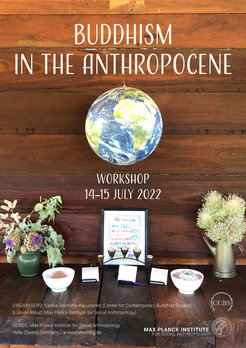Buddhism in the Anthropocene – What Can We Learn from Non-Western Traditions?
A conference titled “Buddhism in the Anthropocene” will take place on 14 and 15 July at the Max Planck Institute for Social Anthropology (MPI). Using case studies, anthropologists and scholars of Buddhism look at how Buddhist communities are responding to the challenges of the Anthropocene – that is, the far-reaching human-caused changes to the climate and environment. The conference was organized by Saskia Abrahms-Kavunenko (Centre for Contemporary Buddhist Studies, University of Copenhagen) and Jovan Maud (MPI).

In Search of Alternative Ways of Living in the Anthropocene
It is undeniable: our exploitation of the resources of our planet has produced dramatic changes with catastrophic effects that extend to the farthest corners of the Earth. Melting glaciers, rising sea levels, mass extinctions, pollution and destruction of ecosystems, the rapid progression of global warming – the consequences for both human life and sensitive planetary systems are immense. Yet while there is no doubt about the extent of human-caused changes, it is also clear that not everyone has contributed to these changes to the same degree. Those of us in Western industrial capitalist societies, who bear the greatest responsibility for exploiting the Earth, might therefore look beyond our borders to consider whether there are other ways of life that encourage a more humble and respectful relationship with our planet. For it has become clear that the Earth systems and planetary processes are far too complex for us to take our accustomed approach of trying to bend them to our will or steer them in a particular direction. “Around the world, Buddhists are grappling in diverse ways with the consequences of the Anthropocene and human activity,” says Jovan Maud, an MPI researcher and editor of the Journal of Global Buddhism. “Our conference therefore asks whether Buddhist spiritual traditions and ways of life can offer insights into possible alternative ways to facing the challenges of the Anthropocene.”
Empirical Case Studies and Open Research Questions
While the conference looks for alternatives to Western paradigms, it is interested in the diversity of Buddhist ways of life, and it should not be understood as presenting preconceived moral judgments or perpetuating a simplistic dichotomy between Western rationalism and Eastern spirituality. “Instead, we bring together ethnographic and historical studies that show how Buddhist groups and communities respond to the changes and transformations of the Anthropocene”, says Maud. One of the case studies, for example, looks at Sikkim, a region in the Himalayas which is considered sacred by Buddhist communities and which has been greatly damaged by state infrastructure development projects. The mobilization of resistance to these massive interventions into the landscape was driven in large part by spiritual narratives from indigenous and Buddhist traditions. As a result of this activism, some of the large-scale projects have successfully been halted. “But it is important to recognize that Buddhists are not by any means completely closed-off to modern ways of life”, Maud explains. “For example, the streams of pilgrims to major Buddhist sites, the production of ritual products out of plastic, and the management of large monasteries contribute to the negative consequences of the Anthropocene every bit as much as lifestyles that are labelled as ‘Western’.” It is precisely this tension between idealization and reality that makes the questions being considered at the conference so interesting. Maud explains: “We want to discuss things like why Buddhist ideas play such a major role among those who protest against climate change and other phenomena of the Anthropocene. Or whether Buddhist concepts like karma, impermanence, notions of deep time, or death and dying provide us with new inspiration for how to act in the Anthropocene.” The answers to these questions, as elaborated in the conference papers, are to be published in a special edition of the Journal of Global Buddhism in 2023.
Conference programme
https://s.gwdg.de/DSqsZK
More information on the Centre for Contemporary Buddhist Studies
https://ccrs.ku.dk/research/centres/centre-for-contemporary-buddhist-studies/
Contact for this Press Release
Dr. Jovan Maud
Max Planck Institute for Social Anthropology
Department 'Anthropology of Politics and Governance'
Advokatenweg 36, 06114 Halle (Saale)
Tel.: 0345 2927-130
Mail: maud@eth.mpg.de
https://www.eth.mpg.de/maud
Dr. Saskia Abrahms-Kavunenko
University of Copenhagen
Centre for Contemporary Buddhist Studies
s.abrahms.k@hum.ku.dk
PR Contact
Stefan Schwendtner
Press and public relations
Max Planck Institute for Social Anthropology
Advokatenweg 36, 06114 Halle (Saale)
Tel.: 0345 2927-425
Mail: schwendtner@eth.mpg.de
http://www.eth.mpg.de
